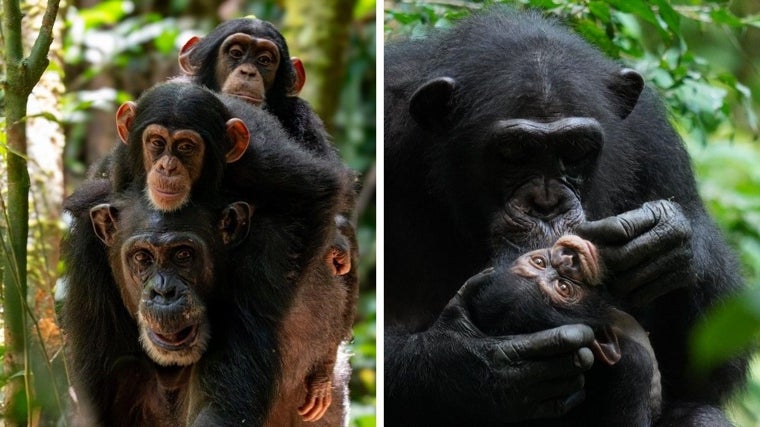Chimpanzees don't have 'mommy issues': they grow up without major trauma caused by toxic mothers.

Psychologists have long known that early attachment to primary caregivers, usually parents, plays a crucial role in a child's development, influencing the adult they will become later in life. A secure attachment, in which caregivers are available and reliable, often results in more secure and empathetic children; an insecure-avoidant attachment, in which parents fail to respond to emotional needs, can cause children to stop demanding them and rely solely on themselves; and a disorganized attachment style, children may experience aggression, fear, or trauma.
For the first time, a group of researchers from the Max Planck Institute for Evolutionary Anthropology in Leipzig, Germany, wanted to find out whether these bonds are replicated among chimpanzees , our closest relatives . And indeed, they are, with one distinction: when parenting occurs in the wild, the ape offspring rarely suffer major trauma from neglectful mothers. In other words, disorganized attachment is barely recorded. For the researchers, this means that secure, organized attachment has deep evolutionary roots, while disorganized attachment is shaped by the environment in which the child grows up. They report on this in ' Nature Human Behavior' .
Scientists observed the behavior of wild chimpanzees in Taï National Park, Ivory Coast, for four years. Thirty of them were up to 10 years old. They found that some infants feel secure, turn to their mother for comfort in times of distress, and explore their environment with confidence, knowing she is there to support them. Others have an insecure-avoidant attachment, meaning they tend to be more independent and don't seek comfort from their mothers as much. However, they showed no signs of disorganized attachment, such as hitting or attacking their mothers. This differentiates them from humans, where 23.5% of infants suffer from disorganized attachment, and from orphaned chimpanzees in captivity, where it occurs in 61% of cases.
 A mother chimpanzee carries her twins on her back. On the right, another female grooms a young one.
Antoine Valet / LIRAN samuni / Tai Chimpanzee Project
A mother chimpanzee carries her twins on her back. On the right, another female grooms a young one.
Antoine Valet / LIRAN samuni / Tai Chimpanzee Project
In humans, disorganized attachment occurs when a child experiences fear, trauma, or aggression from their caregiver. As a result, the child may display confusing behaviors, desiring affection but also fearing the caregiver. This type of attachment can lead to difficulties with emotional regulation, social integration, and long-term mental health problems. Disorganized attachment is considered maladaptive because it leaves the child uncertain about how to respond in times of distress, which could hinder their ability to cope effectively and affect their overall survival.
Chimpanzees in captivity, particularly orphans raised by humans, often develop this type of traumatic attachment, likely due to the lack of a permanent caregiver. However, in the wild, where chimpanzees grow up in stable family groups and face natural survival pressures such as predation, researchers found no evidence of disorganized attachment, "supporting the hypothesis that this type of attachment might not be an adaptive survival strategy in the face of environmental constraints," says first author Eléonore Rolland. This suggests that if disorganized attachment occasionally occurs in wild chimpanzees, these individuals are unlikely to survive or reproduce.
Attachment theory is a key concept in psychology that explains how early relationships shape emotional and social development. Secure attachment is associated with trust and resilience, while insecure and disorganized attachment can be associated with anxiety, stress, or relationship difficulties. The fact that wild chimpanzees only displayed secure or avoidant attachment raises new questions about modern human parenting. “Our results deepen our understanding of chimpanzee social development and show that humans and chimpanzees are not so different after all,” Rolland says. “But they also make us think: Have some modern human caregiving institutions or practices strayed from what is best for child development?”
“By identifying attachment patterns in wild chimpanzees, we provide important insights into the roots of human social behavior,” says lead author Roman Wittig. This study connects psychology, animal behavior, and anthropology, shedding light on how attachment strategies have evolved across species. “Our findings,” says lead author Catherine Crockfor, “suggest that shared attachment strategies in primates could reflect a common evolutionary heritage. The high prevalence of disorganized attachment in humans and orphaned chimpanzees in captivity, unlike wild chimpanzees, also supports the idea that the rearing environment plays an important role in shaping attachment types.”
According to the researchers, these findings bring us closer to understanding chimpanzees and humans, and stimulate deeper reflection on how early life experiences shape social and emotional development in the species.
ABC.es





